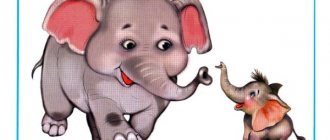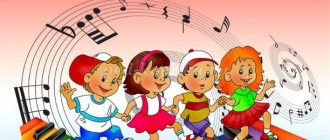MAGAZINE Preschooler.RF
“Cultivating tolerance in preschoolers”Teacher of MADOU d/s No. 37 Tynkacheva M.N.
The problem of protecting children's rights exists all over the world. One of the tasks contributing to its solution is educating the children themselves. From the moment of birth, a person is already endowed with rights that are enshrined in international and Russian legislation:
- Declaration of the Rights of the Child (1959);
- UN Convention on the Rights of the Child (1989);
- World Declaration on the Survival, Protection and Development of Children (1990);
- Family Code of the Russian Federation (1995);
- Federal Law “On Basic Guarantees of the Rights of the Child in the Russian Federation” (1988);
- Law “On Education” (1992), etc.
P 3. 3. 4. Federal state requirements for the structure of the basic general education program of preschool education states: “The content of the educational field “Socialization” is aimed at... solving the following tasks: familiarization with elementary generally accepted norms and rules of relationships with peers and adults (including moral)..."
The main task of the state and society in relation to children is to provide optimal conditions for the development of their individual abilities, the possibility of self-regulation, regardless of psychophysical characteristics, i.e. protect the rights of every child at any stage of his development and form in him the foundations of respect for the rights of others, and introduce him to universal human values.
A modern cultured person is not only an educated person, but also one who has a sense of self-respect and is respected by others. It is important to develop in the younger generation the ability to build relationships in the process of interacting with others on the basis of cooperation and mutual understanding. Willingness to accept other people, their views, customs, habits as they are. The task of a modern educational institution is to ensure that students emerge from its walls not only with a certain amount of knowledge, skills and abilities, but also independent people who have tolerance as the basis of their life position.
“Tolerance is what makes the movement of peace possible and leads from a culture of war to a culture of peace,” says the Declaration of Principles of Tolerance, adopted in 1995 by the General Conference of UNESCO. In the context of humanization and democratization of society, the problem of tolerance is very relevant, since today the values and principles necessary for common survival and development come to the fore:
- ethics and strategy of nonviolence
- the idea of tolerance towards foreign and alien positions, values, cultures
- the need to search for dialogue and mutual understanding, mutually acceptable compromises, etc.
Russia is a multinational state, so from preschool age it is necessary to introduce children not only to the culture of their people, but also to respectful, kind attitude towards representatives of other cultures.
A child begins to form his or her attitude towards a person of a different nationality from about 4 years of age, based on elementary manifestations of universal human feelings and unbiased knowledge, while the uniqueness of the national only emphasizes the significance of what is universal. Typically, children of older preschool age do not come into conflict with people of other nationalities. At the same time, manifestations of a different attitude were noticed: ridicule, mockery, fear, etc. They are based on the following factors:
- childlike spontaneity
- limited life experience
- lack of ideas about people of other nationalities and their culture, lack of communication with them
- childish tactlessness, etc.
A child of senior preschool age can regulate behavior on the basis of learned norms and rules, his own ethical ideas, and not in response to the demands of other people. Emotionally experiences non-compliance with norms and rules and inconsistency of behavior with one’s ethical ideas. Behavior becomes more restrained. Plays together, restrains aggressive reactions, shares, distributes roles fairly, helps in interacting with friends.
Thus, the problem of tolerance can be classified as educational and work in this direction can begin from preschool age, since it is then that the value foundations of the worldview are laid.
It is necessary to acquaint older preschoolers with their basic rights, to form an internal and external legal culture, tolerant behavior, so that the main moral qualities (justice, respect, compassion, goodwill, self-esteem) become an integral part of their lives.
| Next > |




